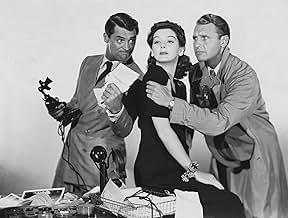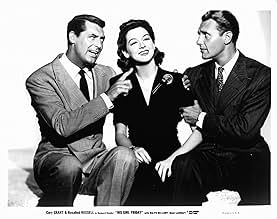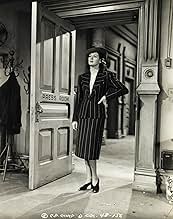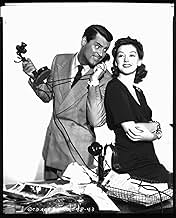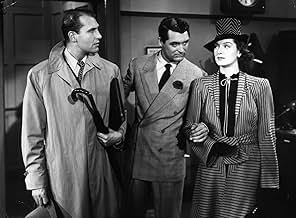Pour récupérer sa femme, qui veut divorcer, le rédacteur en chef d'un grand quotidien l'envoie réaliser un reportage insensé: interviewer un condamné à mort.Pour récupérer sa femme, qui veut divorcer, le rédacteur en chef d'un grand quotidien l'envoie réaliser un reportage insensé: interviewer un condamné à mort.Pour récupérer sa femme, qui veut divorcer, le rédacteur en chef d'un grand quotidien l'envoie réaliser un reportage insensé: interviewer un condamné à mort.
- Réalisation
- Scénario
- Casting principal
- Récompenses
- 5 victoires et 1 nomination au total
Avis à la une
Charles McArthur and Ben Hecht met when both were reporters in Chicago during the 1920s. They created two of the funniest farces in American drama, TWENTIETH CENTURY (about theater people) and THE FRONT PAGE. The latter was based on their experiences as news reporters in those crazy days in Chicago, where the newspapers concentrated on sensationalism and the politics was thoroughly corrupt. The resulting play is hysterically funny and yet remains timely. For all the exaggeration of how Walter Burns and Hildy Johnson manipulate police, politicians, reporters, and civilians to get their scoop, the story remains relevant for several reasons. The political balance in a big Mayoralty election is precarious due to the Earl Williams case. Williams has shot a policeman who is African-American, a big local voting block, and they want him punished. The corrupt Mayor and his idiot jail warden are willing to execute him for the votes needed to stay in office, but the Governor (who is from the rival party) believes the killer is insane (or at least mentally deficient). So already (as you see) race, politics, and the validity of the death penalty get pulled in. Soon we also see examples of nepotism and corruption in the police, and City Hall, cynical politics based on a man's life, and questions about privacy and a free press. For a play from 1931 this one still has relevance.
There had been an earlier version of the play in the 1930s called THE FRONT PAGE, starring Adolphe Menjou as the conniving and devious Walter Burns, and Pat O'Brien as ace reporter Hildy Johnson. It is a good version, and both stars do well with their parts (and both have the verbal speed necessary for the dialog to flow over the ears of the audience). But when the film was remade in 1940, Howard Hawks decided to redraw Hildy Johnson into a female reporter (and previous wife) of Burns. His casting of Cary Grant was radically different too. Burns is a nasty, conniving s.o.b. who would kill for a good story. Menjou was somewhat dapper (he was usually dapper) in the role, but the hardness under the presentable shell was there. And by changing Hildy from a guy to a gal, and Walter's former wife, you had to make Walter look more interesting. So Walter is turned into Cary Grant. There was a search for Hildy, involving Jean Arthur and Irene Dunne as possibilities. Neither ended up playing him. Instead it went to Rosalind Russell.
It has to be admitted Russell had the vocal abilities to push the dialog at the proper clip. Possibly Jean Arthur could have done that just as well, but Arthur did not have the apparent physical strength behind the stylishness that Russell showed. She really does balance well (in this film) with Grant, given their characters.
Motivation changes a little. This Walter Burns still wants to get his scoops, but there are moments of fragility when he realizes he may forever lose Hildy to her fiancé Bruce (the ever helpless Ralph Bellamy). And they oddly work (Hawks manages to keep them under control). Also, as the story is now twelve years older than the original play, certain changes occur in Walter's political views. He does dislike the gang (led by Clarence Kolb and Gene Lockhart) running the city, and points out to Hildy that they have a chance to help give the city the sort of government New York City has under La Guardia. This does not end his joy at scooping the opposition, but it does suggest that Burns has more depth.
It is now generally believed that this is the best of the film versions of THE FRONT PAGE, and one of the funniest films ever made. The entire cast shines (look at the scene where Helen Mack confronts the reporters who have made her look like a tramp, and have told lies about John Qualen (Williams) - she is in a state when Russell takes her out of the press room, and the reporters are thoroughly ashamed of herself - and Russell comes back looking at Regis Toomey, Porter Hall, and the others, and says "Gentlemen of the Press!" with heavy cynical irony). And also note Billy Gilbert's immortal Joe Pettibone, the most hopeless monument of total befuddlement in movies. It is one of the few film comedies of that period that retains it's laughs one viewing following another.
There had been an earlier version of the play in the 1930s called THE FRONT PAGE, starring Adolphe Menjou as the conniving and devious Walter Burns, and Pat O'Brien as ace reporter Hildy Johnson. It is a good version, and both stars do well with their parts (and both have the verbal speed necessary for the dialog to flow over the ears of the audience). But when the film was remade in 1940, Howard Hawks decided to redraw Hildy Johnson into a female reporter (and previous wife) of Burns. His casting of Cary Grant was radically different too. Burns is a nasty, conniving s.o.b. who would kill for a good story. Menjou was somewhat dapper (he was usually dapper) in the role, but the hardness under the presentable shell was there. And by changing Hildy from a guy to a gal, and Walter's former wife, you had to make Walter look more interesting. So Walter is turned into Cary Grant. There was a search for Hildy, involving Jean Arthur and Irene Dunne as possibilities. Neither ended up playing him. Instead it went to Rosalind Russell.
It has to be admitted Russell had the vocal abilities to push the dialog at the proper clip. Possibly Jean Arthur could have done that just as well, but Arthur did not have the apparent physical strength behind the stylishness that Russell showed. She really does balance well (in this film) with Grant, given their characters.
Motivation changes a little. This Walter Burns still wants to get his scoops, but there are moments of fragility when he realizes he may forever lose Hildy to her fiancé Bruce (the ever helpless Ralph Bellamy). And they oddly work (Hawks manages to keep them under control). Also, as the story is now twelve years older than the original play, certain changes occur in Walter's political views. He does dislike the gang (led by Clarence Kolb and Gene Lockhart) running the city, and points out to Hildy that they have a chance to help give the city the sort of government New York City has under La Guardia. This does not end his joy at scooping the opposition, but it does suggest that Burns has more depth.
It is now generally believed that this is the best of the film versions of THE FRONT PAGE, and one of the funniest films ever made. The entire cast shines (look at the scene where Helen Mack confronts the reporters who have made her look like a tramp, and have told lies about John Qualen (Williams) - she is in a state when Russell takes her out of the press room, and the reporters are thoroughly ashamed of herself - and Russell comes back looking at Regis Toomey, Porter Hall, and the others, and says "Gentlemen of the Press!" with heavy cynical irony). And also note Billy Gilbert's immortal Joe Pettibone, the most hopeless monument of total befuddlement in movies. It is one of the few film comedies of that period that retains it's laughs one viewing following another.
Cary Grant and Rosalind Russell make great sparring partners in "His Girl Friday," a remake of "The Front Page."
Grant plays the conniving newspaper publisher Walter Johnson, and Rosalind Russell is the reporter Hildy Johnson, a woman this time, and Johnson's ex-wife. She's trying to get remarried, move to Albany, and quit the newspaper business, but Walter can't bear it.
He cons her into helping out with a controversial death row case and then makes sure her fiancée (Ralph Bellamy) suffers a series of mishaps - arrest for stealing a watch, arrest for "mashing," arrest for counterfeiting, and the theft of his wallet.
This all happens while Hildy interviews Earl Williams, a man due to be hung the next day... and then hides him in a roll-top desk in the courthouse press room when he escapes during a psychiatric evaluation.
It's madcap, all right, and there are no two better people to carry it off than Grant and Russell, who make a great team. It's a hilarious story, with the most rapid-fire, non-stop dialog ever heard anywhere, often with several conversations going on at once. It's exhausting trying to keep up with it.
Strangely, without computers and cell phones, the story of journalists working on a story holds up because the emotions and activities are realistic and still go on. It's as Hildy describes - no set schedule, no normal meals, and long hours. Nothing much has changed.
This is a frenetic comedy, and while the impending hanging of Earl Williams is certainly serious, this plot is more of an excuse to observe the machinations of Hildy and Walter - it's a subplot, though it drives the main story.
"The Front Page" is a favorite of Hollywood's, remade many times - three versions under its original title, a TV series, two TV productions, plus the film "Switching Channels." And of course, "His Girl Friday," possibly the best of all of them.
Grant plays the conniving newspaper publisher Walter Johnson, and Rosalind Russell is the reporter Hildy Johnson, a woman this time, and Johnson's ex-wife. She's trying to get remarried, move to Albany, and quit the newspaper business, but Walter can't bear it.
He cons her into helping out with a controversial death row case and then makes sure her fiancée (Ralph Bellamy) suffers a series of mishaps - arrest for stealing a watch, arrest for "mashing," arrest for counterfeiting, and the theft of his wallet.
This all happens while Hildy interviews Earl Williams, a man due to be hung the next day... and then hides him in a roll-top desk in the courthouse press room when he escapes during a psychiatric evaluation.
It's madcap, all right, and there are no two better people to carry it off than Grant and Russell, who make a great team. It's a hilarious story, with the most rapid-fire, non-stop dialog ever heard anywhere, often with several conversations going on at once. It's exhausting trying to keep up with it.
Strangely, without computers and cell phones, the story of journalists working on a story holds up because the emotions and activities are realistic and still go on. It's as Hildy describes - no set schedule, no normal meals, and long hours. Nothing much has changed.
This is a frenetic comedy, and while the impending hanging of Earl Williams is certainly serious, this plot is more of an excuse to observe the machinations of Hildy and Walter - it's a subplot, though it drives the main story.
"The Front Page" is a favorite of Hollywood's, remade many times - three versions under its original title, a TV series, two TV productions, plus the film "Switching Channels." And of course, "His Girl Friday," possibly the best of all of them.
10robb_772
As if creating one comedic masterpiece with 1938's BRINGING UP BABY was not enough, director Howard Hawks returned to the same genre a scant two years later - and he somehow managed to rival even his own previous masterwork. Nominally a reworking Ben Hecht and Charles MacArthur's play THE FRONT PAGE, HIS GIRL Friday manages to surpass it's classic source material and emerge as one of the screen's finest comedies. The film is also perhaps the perfect example of Hawks' trademarked rapid-fire, overlapping dialogue, which has never been as fast nor as furious anywhere else before or since. This is certainly one of the fastest moving comedies ever filmed, and the whole cast never misses a beat.
Walter Burns, the conniving, self-serving newspaper editor, is a character that could have easily come off as a tyrannical jerk. As portrayed by the suave Cary Grant, however, the pompous, arrogant Burns actually becomes (gasp!) likable! It is a difficult balancing act that Grant must perform as teetering between the two extremes of the character, and he is arguably the only actor imaginable with the skill and charisma to pull such a tricky characterization off this successfully. And the one-and-only Rosalind Russell is every bit his match - full of verve and aplomb, Russell's Hildy is an independent career woman, brimming with intelligence and class, that impressively pre-dates the major feminist movement of the mid-sixties by a good 25 years.
The film's supporting cast is no less impressive, with every single role cast to perfection. This is particularly true of Ralph Bellamy, who (along with his Oscar-nominated performance in 1937's THE AWFUL TRUTH) proves once again that he is the ultimate straight man. The film contains some grim subject matter that may seem like unlikely fodder for a screwball comedy (murder, attempted suicide, and public execution are all touched upon), although the film somehow manages to deal with such topics respectfully and without sacrificing any laughs. In the end, HIS GIRL Friday is an absolutely unbeatable romantic comedy that remains wildly hilarious and comes as close to sheer perfection as any motion picture could ever hope to.
Walter Burns, the conniving, self-serving newspaper editor, is a character that could have easily come off as a tyrannical jerk. As portrayed by the suave Cary Grant, however, the pompous, arrogant Burns actually becomes (gasp!) likable! It is a difficult balancing act that Grant must perform as teetering between the two extremes of the character, and he is arguably the only actor imaginable with the skill and charisma to pull such a tricky characterization off this successfully. And the one-and-only Rosalind Russell is every bit his match - full of verve and aplomb, Russell's Hildy is an independent career woman, brimming with intelligence and class, that impressively pre-dates the major feminist movement of the mid-sixties by a good 25 years.
The film's supporting cast is no less impressive, with every single role cast to perfection. This is particularly true of Ralph Bellamy, who (along with his Oscar-nominated performance in 1937's THE AWFUL TRUTH) proves once again that he is the ultimate straight man. The film contains some grim subject matter that may seem like unlikely fodder for a screwball comedy (murder, attempted suicide, and public execution are all touched upon), although the film somehow manages to deal with such topics respectfully and without sacrificing any laughs. In the end, HIS GIRL Friday is an absolutely unbeatable romantic comedy that remains wildly hilarious and comes as close to sheer perfection as any motion picture could ever hope to.
Every good thing you've heard about this movie is true. It may very well be the fastest paced movie I've ever seen. Jerry Bruckheimer's most hyperbolic action movie ain't got nothing' on this one.
Cary Grant and Rosalind Russell were a brilliant screen pair (indeed, it seems that no one was bad casting when paired with Cary Grant) as rival reporters in a furiously paced news office. Russell is the odd man, or should I say odd girl, out, due to her lack of a penis, but she proves herself more than capable of holding her own with the boys.
Russell charges across the screen and never loses momentum for a second. She's goofy, sexy and hysterical. The funniest moment in the film comes when she's chasing a man down the street (I won't go into details) and dive tackles him to the ground.
One of the first films from the 40s and a highlight of the decade.
Grade: A+
Cary Grant and Rosalind Russell were a brilliant screen pair (indeed, it seems that no one was bad casting when paired with Cary Grant) as rival reporters in a furiously paced news office. Russell is the odd man, or should I say odd girl, out, due to her lack of a penis, but she proves herself more than capable of holding her own with the boys.
Russell charges across the screen and never loses momentum for a second. She's goofy, sexy and hysterical. The funniest moment in the film comes when she's chasing a man down the street (I won't go into details) and dive tackles him to the ground.
One of the first films from the 40s and a highlight of the decade.
Grade: A+
When I learned about Howard Hawkes screwball comedy "His Girl Friday," one of the biggest attractions, I was told, was the fast-paced/overlapping dialogue. During this time in Hollywood, dialogue would only be spoken by one person at a time. "His Girl Friday" was one of the first films to have characters speaking at the same time, often over one another; this would create an environment that was more realistic, especially in a place such as a newspaper room. Well, if that's what Hawkes was going for, he certainly achieved it.
The best thing about the film IS the dialogue. Characters speak at a break-neck speed, throwing witticisms left and right as if they were candy. Many times, while one is laughing at one joke, they would miss another right after it. That is how quickly the jokes are thrown out in the film. Cary Grant and Rosalind Russell are great at spilling lines out seemingly without any problem. It's a real testament to how professional these two were (along with the rest of the cast) with the amount of verbal meat they had to chew; I can't think of an actor today that could possibly pull of the kind of dialogue that was given in this film.
The problem that I had with the film was that the dialogue was the ONLY great thing about it. Unfortunately, the characters and situations presented in the film had little sympathy and lack of any kind of real depth. The situation with the falsely accused murderer was handled poorly given the context of his predicament; instead of really caring about this person and really trying to help him become cleared of charges, the Grant and Rosalind characters instead used him for their own purposes in getting "the big scoop." Now, of course one can argue that that WAS the reason they treated him the way they did, my issue is that such a serious subject was handled in a supposed "comedic" fashion; as if it was OK that this falsely accused person can be treated in such a horrible way, simply because it handled comedically. The last-second deus ex machina that sealed this person's fate supports the idea that his story wasn't really handled with any kind of importance.
The thing the really hurt the film was the love triangle between the Grant and Rosalind characters, and the Rosalind's character's fiancé. We are told in the beginning of the film that Grant and Rosalind are divorcees, and Rosalind is set to marry her fiancé the very next day in Albany. Of course, in a film like this, we are supposed to root for the Grant and Rosalind characters to get together at the end. the problem is, the Grant character is such a manipulative creep that at the end of the film I found myself actually rooting for the fiancé to the win the girl. Three times in the movie, the Grant character manipulates the situation, causing the fiancé to be thrown in jail, and preventing the would-be married couple from leaving the city. This in turn gives the Grant character enough time to convince Rosalind that she will always be "a newspaperman." The Rosalind character isn't much better either. Throughout the beginning of the film, she keeps explaining to others that she is through with the newspaper business, that she wants to settle down, raise a family, and not have to deal with the daily grind of hunting down a story. Well, does settling down and having a family sound like a bad thing to you? I didn't think so. Every time she tries to leave, she gets bogged down and distracted by the story (many times through the very fault of the Grant character). It gets so bad, that when the fiancé comes to her, begging her to leave with him, she brushes him off like a fly, barely acknowledging him. Even worse, when the fiancé's mother comes into play, the Rosalind character actually ALLOWS Grant to have her kidnapped and taken away! "His Girl Friday" would've worked if the filmmakers had cared enough about the characters than they did about the dialogue. The actor playing the fiancé did a thankless job; without much to work with, he actually created a character we cared about more so than the two leads. Sure he was a little simple, but that's a lot more than can be said about the other two. At the end of the film, I thought to myself "these two characters were divorced before the film started. Based on all the manipulative actions these two had throughout the story, is there any evidence that they'll stay together once the movie is over?" Maybe they deserve each other, because they certainly don't deserve anyone else.
The best thing about the film IS the dialogue. Characters speak at a break-neck speed, throwing witticisms left and right as if they were candy. Many times, while one is laughing at one joke, they would miss another right after it. That is how quickly the jokes are thrown out in the film. Cary Grant and Rosalind Russell are great at spilling lines out seemingly without any problem. It's a real testament to how professional these two were (along with the rest of the cast) with the amount of verbal meat they had to chew; I can't think of an actor today that could possibly pull of the kind of dialogue that was given in this film.
The problem that I had with the film was that the dialogue was the ONLY great thing about it. Unfortunately, the characters and situations presented in the film had little sympathy and lack of any kind of real depth. The situation with the falsely accused murderer was handled poorly given the context of his predicament; instead of really caring about this person and really trying to help him become cleared of charges, the Grant and Rosalind characters instead used him for their own purposes in getting "the big scoop." Now, of course one can argue that that WAS the reason they treated him the way they did, my issue is that such a serious subject was handled in a supposed "comedic" fashion; as if it was OK that this falsely accused person can be treated in such a horrible way, simply because it handled comedically. The last-second deus ex machina that sealed this person's fate supports the idea that his story wasn't really handled with any kind of importance.
The thing the really hurt the film was the love triangle between the Grant and Rosalind characters, and the Rosalind's character's fiancé. We are told in the beginning of the film that Grant and Rosalind are divorcees, and Rosalind is set to marry her fiancé the very next day in Albany. Of course, in a film like this, we are supposed to root for the Grant and Rosalind characters to get together at the end. the problem is, the Grant character is such a manipulative creep that at the end of the film I found myself actually rooting for the fiancé to the win the girl. Three times in the movie, the Grant character manipulates the situation, causing the fiancé to be thrown in jail, and preventing the would-be married couple from leaving the city. This in turn gives the Grant character enough time to convince Rosalind that she will always be "a newspaperman." The Rosalind character isn't much better either. Throughout the beginning of the film, she keeps explaining to others that she is through with the newspaper business, that she wants to settle down, raise a family, and not have to deal with the daily grind of hunting down a story. Well, does settling down and having a family sound like a bad thing to you? I didn't think so. Every time she tries to leave, she gets bogged down and distracted by the story (many times through the very fault of the Grant character). It gets so bad, that when the fiancé comes to her, begging her to leave with him, she brushes him off like a fly, barely acknowledging him. Even worse, when the fiancé's mother comes into play, the Rosalind character actually ALLOWS Grant to have her kidnapped and taken away! "His Girl Friday" would've worked if the filmmakers had cared enough about the characters than they did about the dialogue. The actor playing the fiancé did a thankless job; without much to work with, he actually created a character we cared about more so than the two leads. Sure he was a little simple, but that's a lot more than can be said about the other two. At the end of the film, I thought to myself "these two characters were divorced before the film started. Based on all the manipulative actions these two had throughout the story, is there any evidence that they'll stay together once the movie is over?" Maybe they deserve each other, because they certainly don't deserve anyone else.
Le saviez-vous
- AnecdotesIt is estimated that the normal rate of verbal dialogue in most films is around 90 words a minute. In La dame du vendredi (1940), the delivery has been clocked at 240 words a minute.
- GaffesWhen Bruce Baldwin comes to the press room late in the movie, an electric fan and small shelf on the wall to the left of the door both completely disappear. Both have been there in all previous scenes and both reappear after this scene.
- Citations
[describing Bruce]
Walter Burns: He looks like that fellow in the movies - Ralph Bellamy.
- Crédits fousOpening credits prologue: It all happened in the "Dark Ages" of the newspaper game--when to a reporter "Getting that story" justified anything short of murder.
Incidentally you will see in this picture no resemblance to the man and woman of the press today.
Ready?
Well, once upon a time - -
- ConnexionsEdited into Michael Jackson's This Is It (2009)
Meilleurs choix
Connectez-vous pour évaluer et suivre la liste de favoris afin de recevoir des recommandations personnalisées
Détails
- Date de sortie
- Pays d’origine
- Langues
- Aussi connu sous le nom de
- Ayuno de amor
- Lieux de tournage
- Société de production
- Voir plus de crédits d'entreprise sur IMDbPro
Box-office
- Montant brut mondial
- 330 $US
- Durée1 heure 32 minutes
- Couleur
- Rapport de forme
- 1.37 : 1
Contribuer à cette page
Suggérer une modification ou ajouter du contenu manquant




